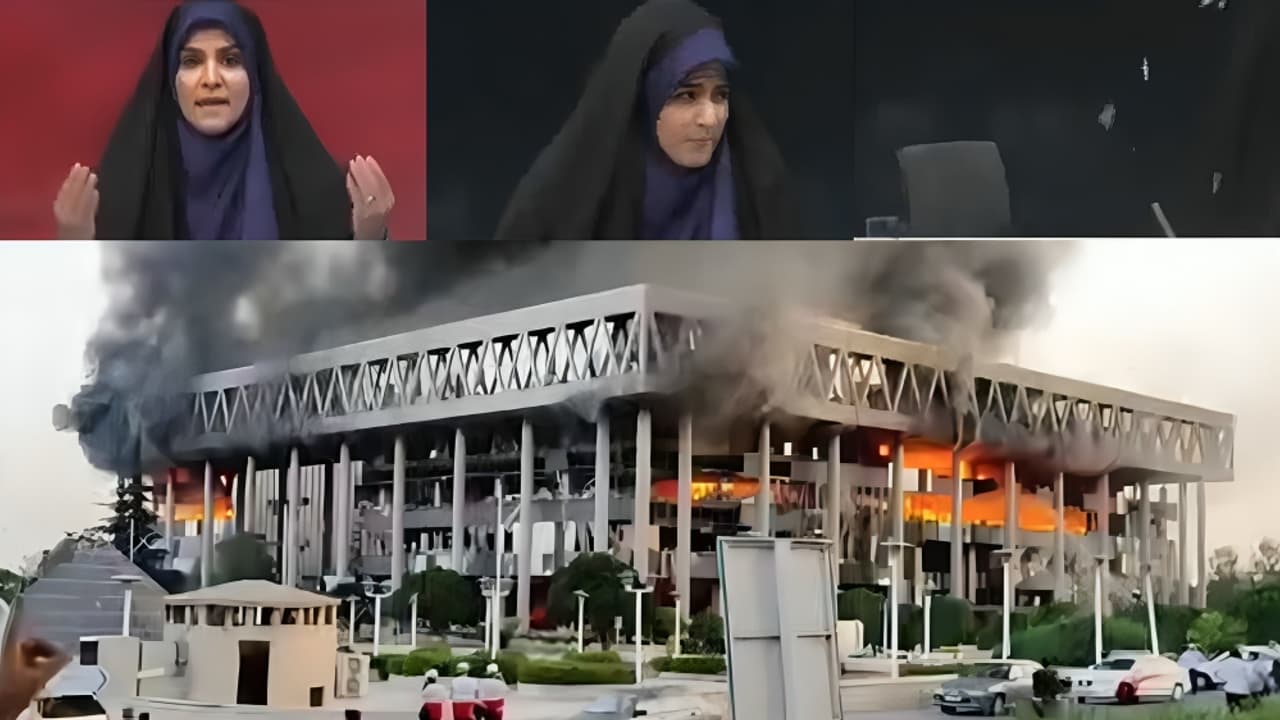Israel and Iran continue their deadliest-ever confrontation, with strikes on military, nuclear and media targets. As Israel claims full air control over Tehran, fears rise of a prolonged regional war involving vital infrastructure and civilians.
Israel and Iran exchanged heavy fire for the fourth straight day on Monday, marking their most intense direct conflict to date and raising fears of a wider war across the Middle East.

What began as covert operations and proxy battles has now escalated into open confrontation, with deadly airstrikes, missile barrages, and growing casualties on both sides.
Since the start of the Israel-Hamas war in October 2023, tensions have steadily climbed, drawing regional players deeper into the fray. Israel is now targeting Iranian nuclear and military sites, while Tehran is striking back with missiles, drones, and threats of further escalation. Here are the latest developments:
Live broadcast cut as Israeli strike hits Iranian state TV building
Iran’s state-run television abruptly halted a live broadcast on Monday after an Israeli strike hit the area housing its studios. During the transmission, the anchorwoman could be seen reacting to tremors and dust inside the studio as she described “the sound of aggression against the homeland.”
Moments later, a loud explosion disrupted the feed, cutting out the screen behind her as she hurried off camera. The network immediately switched to pre-recorded programming.
The incident came shortly after Israel had warned residents to evacuate Tehran’s District 3, which includes key media and diplomatic installations.
Mounting casualties
In a major campaign launched early Friday, Israeli fighter jets and drones have struck nuclear and military sites in Iran, also hitting residential areas and fuel depots.
Iran's health ministry says at least 224 people have been killed and more than 1,200 wounded.
Tehran has responded with barrages of missiles and drones that hit Israeli cities and towns, killing at least 24 people and wounding 592 others, according to the prime minister's office.
Israel has also killed many top military commanders and atomic scientists in Iran as part of an offensive that officials say seeks to end nuclear and missile threats from the Islamic republic.
Devastating strikes
Israeli strikes could be heard across the capital, AFP journalists reported, after Israel issued an evacuation order for the northern District 3, home to embassies and UN offices.
The Iranian state broadcaster IRIB building, located in the district, was hit in a strike, following Israeli Defence Minister Israel Katz's warning that "the Iranian propaganda and incitement megaphone is about to disappear."
The Israeli military said that after a wave of strikes on Monday, its forces had destroyed one third of Iran's surface-to-surface missile launchers.
According to military spokesman Effie Defrin, "we have now achieved full air superiority over Tehran".
That followed a wave of intense air raids across the country, from the western border with Iraq to the capital Tehran and as far east as Mashhad, where the airport was hit.
In Tehran early Monday, Israel said it hit command centres belonging to the Quds Force, the foreign operations arm of the Islamic Revolutionary Guard Corps.
Reza Sayyad, spokesman for the Iranian armed forces, said their targets in Israel included "sensitive and important" security sites as well as "the residences of military commanders and scientists".
An Israeli official told AFP that among the sites hit on Sunday was a major oil refinery in the coastal city of Haifa.
Sayyad, in a televised address, vowed a "devastating response" to the Israeli attacks, while the Revolutionary Guards in a statement warned they would hit more "vital targets" in Israel "until its complete destruction".
Residential areas in both countries have suffered, with Israel accusing Iran of deliberately targeting civilians.
Pakistan 'warned of' nuclear reply against Israel
Amid rising Israel-Iran tensions, senior Iranian official Mohsen Rezaei claimed on state TV that Pakistan assured Iran it would launch a nuclear strike on Israel if Tel Aviv uses nuclear weapons against Iran.
Pakistan’s military has not officially responded. However, Pakistan possesses the Shaheen-III missile with a 2,700 km range, capable of striking Israel, and it is operational within Pakistan’s strategic forces.
Diplomacy
The conflict has rapidly escalated despite calls from world leaders to halt the attacks.
China urged Iran and Israel to "immediately" take steps to reduce tensions and "prevent the region from falling into greater turmoil".
Turkish President Recep Tayyip Erdogan told his Iranian counterpart in a phone call on Monday that Ankara was ready to play a "facilitating role" to end the conflict.
British Prime Minister Keir Starmer said he believed "there's a consensus for de-escalation" among Group of Seven leaders, who are meeting in Canada.
US President Donald Trump has urged the foes to "make a deal", but told reporters Sunday that "sometimes they have to fight it out" first.
The aircraft carrier USS Nimitz was reportedly headed to the Middle East to boost the US presence in the region.
Nuclear fears grow as conflict escalates
Israeli Prime Minister Benjamin Netanyahu has said the ongoing offensive is aimed at neutralising Iran’s “existential” nuclear and missile threats. The air campaign began just as Tehran and Washington were in the midst of nuclear negotiations — talks that have now collapsed.
Amid the escalating strikes, Rafael Grossi, chief of the UN’s International Atomic Energy Agency (IAEA), confirmed there was “no indication of a physical attack” on the underground section of Iran’s Natanz uranium enrichment site. However, a key above-ground facility was destroyed. Grossi warned the IAEA board that “nuclear safety is being compromised” by the conflict.
(With AFP inputs)


